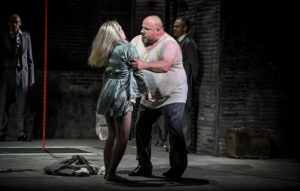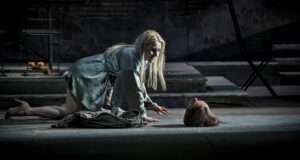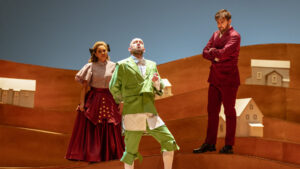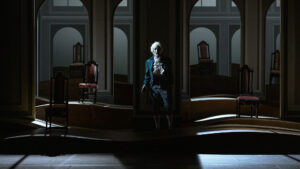When it became clear that the number of premieres of this year’s season at Teatr Wielki-Polish National Opera would come down to a total of three – a certain co-production that we will see four years after its opening in Salzburg lambasted by the critics; yet another staging of one of the most popular operas in the repertoire; and a world premiere of a work that I don’t quite see returning to any stage – I again became jealous of the Czechs. Czech opera companies offer a true embarrassment of riches, there are plenty of rarities in their repertoires and the interest of international critics is huge. This is hardly surprising: the Czechs don’t need to fill their casts with foreign stars of dubious quality, nor do they lack great directors or competent conductors. Besides, they don’t go to the opera once in a blue moon, but on a regular basis and they are really knowledgeable about it.
What has certainly contributed to this state of affairs is the bourgeois egalitarianism of our southern neighbours, who, unlike Poles with their sabre-wielding longings, have opera in their blood. Yet when I went to the Janáček Theatre in Brno for day-to-day performances of Strauss’ Salome and Dvorák’s comic opera Jakobín, completely unknown in Poland, I did not expect that in both cases I would be confronted with a theatre that was open and modern, and, at the same, time stemming from a tradition dating back at least to the beginning of the previous century.
Suffice it to say that David Radok, director of the Brno Salome, is the son of Alfréd, a legend of twentieth-century Czech theatre, co-creator – with Miloš Forman, among others – of the famous Laterna Magika, and a member of the D34 theatre company founded by Emil František Burian. Emil František, in turn, was the son of Emil Burian, one of the first performers of the role of the eponymous Jacobin in Dvorák’s opera. Emil’s younger brother Karel Burian sang the role of Herodes at the premiere of Salome at the Semperoper. When I began to investigate what the young Lucie Kaňková, Terinka in the Brno Jakobín, meant when she claimed to come from a family of respected Prague musicians, I discovered that on her father’s side she was a great-great-granddaughter of Jan Nepomuk Kaňka, Beethoven’s composer and lawyer friend, and on her mother’s side – a great-granddaughter of the violinist Jindřich Feld, whose students included Rafael Kubelik. I postponed further research, so as not to be influenced by anything. What if the apples did fall far from the tree this time?
Salome. Linda Ballová in the title role, and Jaroslav Březina (Herodes). Photo: Marek Olbrzymek
Born in 1954, David Radok emigrated with his family from Czechoslovakia after the defeat of the Prague Spring. He learned his craft in Gothenburg, primarily at the Folkteater, where his father Alfréd found refuge. He made his debut as a director at the local opera house with a staging of Menotti’s The Medium. In fact, he has continued his collaboration with Scandinavian companies to this day: he is the man behind the Peter Grimes production, dusted off after nearly thirty years and very well received in Copenhagen, which in May saved the honour of the Operaen, when a co-production with Warsaw’s Teatr Wielki-Polish National Opera fell through for reasons that are yet to be explained. He has dozens of productions to his credit, primarily of Baroque and modernist operas. His stagings are clean, but dark, precise and marked by a uniquely Czech brand of black humour. This was also the case of Salome, although the action, set on an almost empty stage enclosed on three sides by a brick structure reminiscent of the interior of the ruined Basilica of Maxentius in Rome (set design by Dragan Stojčevski), unfolded rather sluggishly at first. I suspect that the director may have intended to build tension in this powerful one-act opera by means of the Hitchcock method, but the earthquake started only with the confrontation between Salome and Jochanaan. When the prophet emerged, dripping with water, from the trapdoor – with a black sack over his head, hauled out of the palace cistern in chains – the audience shuddered with horror for the first time. Radok’s concept proved coherent: Herodes’ palace was a universal metaphor for totalitarian violence and decay of all values. Hence the bizarre hotchpotch of costumes (designed by Zuzana Ježkova), ranging from operetta-style liveries, uniforms and suits, silk gowns and déshabillés, to the slightly over-the-top idea of having The Page of Herodias wear a Muslim niqab; hence the repulsive austerity of the sets and the terrifying indifferentism of the protagonists. There are only monsters roaming around the stage. Had the footmen not rushed to wipe the blood on the floor, Narraboth’s suicide would have gone unnoticed. Orgies and scheming take place somewhere in the background, almost imperceptibly, behind the semi-translucent glass of the palace’s living room. Paradoxically, the character that turns out to be the most human in the drama is the weak, demoralised Herodes – shouting that he will not allow the saviour of the world to raise the dead, because that would be horrible; frozen in humiliation when Salome, in the finale of the Dance of the Seven Veils, pushes his face into her crotch; vomiting with fear and disgust, when his stepdaughter gets her way and has the servants bring Jochanaan’s severed head on a silver platter. My perception of the Brno production may have been influenced by the current events in Poland – but I have to admit that the downfall of the grotesque tetrarch made a much bigger impression on me than the dilemmas and frustrations of the utterly spoiled Salome.
It is more likely, however, I was a bit disappointed by the performer of the title role, the Slovakian Linda Ballová – an excellent and extremely convincing actress as a psychopathic Lolita Salome, but possessing a soprano that I cannot, for the life of me, associate with a “sixteen-year-old princess with the voice of an Isolde” as Strauss himself suggested. Ballová’s voice, relatively small, artificially darkened and characterised by a persistent, uncontrolled vibrato, pales in comparison with the luminous, truly girlish sopranos of Destinn and Cebotari, and above all the phenomenal Olive Fremstad, who sang Salome in the American premiere of the work at the Metropolitan Opera in 1907. Despite the powerful orchestration, those singers easily cut through the dense tutti: Ballová continuously struggled with the matter, at times departing from the musical text, and even the famous low G flat on the last word of her monologue was lost in the flood of instrumental chords.
Salome. Linda Ballová. Photo: Marek Olbrzymek
However, the other members of the cast did a great job, led by the phenomenal – also acting-wise – Jaroslav Březina in the role of Herodes. Warm words of praise should go to Vit Nosek, who sang Narraboth with a rounded and ardent tenor, although he was not fully able to cope with the tasks entrusted to him by the director. The vengeful Heriodias was successfully portrayed by the experienced Eva Urbanová, a singer endowed with a powerful and superbly controlled soprano; Jochanaan was convincingly sung by the German baritone Birger Radde, a technically superb, extremely musical singer with a voice that is exceptionally noble, beautiful and rich. Marko Ivanovic led the whole thing with an assured hand, but at times paying too much attention to polishing individual details – at the expense of the agitated, kaleidoscopic narrative of this remarkable score.
After such intense impressions of the previous evening, the meeting with Jakobín obviously took place in a completely different atmosphere. The fruit of Dvorák’s second collaboration with the librettist Marie Červinkova-Riegrova – after the mediocre success of the 1882 production of Dimitrij – proved to be the first real triumph in the composer’s operatic career. The story of Bohuš, son of Count Vilém – who returns to his homeland incognito, together with his wife Julie, only to discover that his father is still convinced that his first-born has allied himself in France with the Jacobins and married a woman of ill repute in Paris – runs parallel to the love story of Terinka, daughter of the choirmaster Benda, and Jiří, gamekeeper at the count’s estates, jealous of burgrave Filip, who is courting his fiancée. Dramaturgically, the thing struggles a bit, musically it dazzles, both with the lyricism of the vocal parts and the sumptuous orchestration as well as references to, on the one hand, Czech folklore and on the other – Italian comic opera and the opéra à sauvetage, a genre popular in the late eighteenth and early nineteenth century, the example of which was also Beethoven’s Fidelio.
Jakobín. Pavla Vykopalová (Julie), Jan Šťáva (Filip), and Roman Hoza (Bohuš). Photo: Marek Olbrzymek
This convoluted story was tackled by Martin Glaser, a director a generation younger than Radok, but nevertheless faithful to the Czech tradition of engaged theatre, imbued with the spirit of satire and, at the same time, with the poetic magic of old school plays, which, in the words of Jan Komenský, were to entertain in a way that would make “our games a preparation for serious matters”. In his delightfully colourful Jakobín we can find not only inspirations from eighteenth-century Hanakian opera, but also less obvious, perhaps not entirely conscious references to the oeuvres of other directors from this part of Europe (I’m thinking of, for example, the undulating wooden platforms known from Nekrošius’ productions, with which Glaser builds the landscape of an imaginary town just as evocatively as he creates the interior of the count’s palace). How I miss such stagings: beautiful, clean and clear, human in the most literal sense of the word, provoking laughter and emotion, perfectly coupled with the composer’s idea.
This makes it all the more gratifying that the main contributor to the success of Jakobín was the Janáček Theatre team. The singers permanently affiliated with the Brno company were completed by just two artists: Lucie Kaňková, a singer blessed with a luminous, colourful soprano beautifully opened at the top, and Aleš Briscein as Jiří, an indefatigable and reliable tenor, who brings to mind Klaus Florian Vogt – the difference being, however, that, unlike the German star, he has a truly beautiful voice and uses it with admirable musicality. A lovely pair of the main protagonists came from Pavla Vykopalová (Julie), whose soft soprano had already delighted me in The Greek Passion, and the extraordinarily versatile baritone Roman Hoza (Bohuš), who had clearly worked diligently during his master classes with Christa Ludwig. The indisposed Petr Levíček heroically faced adversity and won over the audience with his bravura portrayal of the choirmaster Benda. The two priests from the production of Martinů’s opera I had seen – David Szendiuch and Jan Šťáva – showed themselves at their best as Count Vilém and the grotesque burgrave Filip. The role of the disreputable Adolf, who tries to seize Bohuš’s inheritance, was entrusted to Tadeáš Hoza, Roman’s younger brother, who possesses a baritone equally well placed, albeit a bit brighter and open more widely in the upper register. Jakub Klecker conducted, making good use of his extensive choral and choirmaster experience in this singing score.
Jakobín. David Szendiuch (Count Vilém). Photo: Marek Olbrzymek
Given the lack of operatic excitement in Poland, I will have to visit Brno more often. If I were to die in an isolation hospital, like field chaplain Matyáš from The Good Soldier Švejk, no one would be pulling their hair out in despair after me. My record is clean: even if I borrowed one thousand eight hundred crowns from someone, I gave it back long ago.
Translated by Anna Kijak




